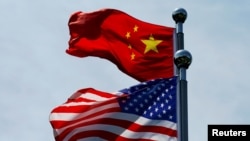Both U.S. and Chinese stock markets recently soared on news that Washington and Beijing have agreed to resume high-level trade talks early next month in anticipation of what China said was to “lay the groundwork for meaningful progress” in their trade dispute.
But analysts urge investors not to get their hopes up, saying that China has not taken U.S. President Donald Trump’s tough stance seriously and a final solution to effect structural changes or major breakthroughs is nowhere in sight.
Concessions not enough
“Negotiations at different stages are sure to take place. But that doesn’t mean, at this stage of negotiations, some small concessions will do the tricks. That’s not possible,” said Lu Suiqi, associate professor of economics at Peking University.
He said that Beijing has been underestimating Trump’s warnings, often made through tweets.
The U.S. president, on Thursday, tweeted comments by U.S. property mogul Sam Zell, in an apparent message to China.
“The Chinese are very adept at not accepting anything. You’ve got to be very tough, and that’s what Trump is doing. It’s in China’s interests to correct,” Trump quoted Zell as saying on business television channel CNBC.
There are, however, few signs that China is doing just that.
Chinese state newspaper Global Times painted a rosy picture of prospects for the upcoming talks, although it also acknowledged that the gap between both countries remains wide.
Impressed with China’s endurance?
In an editorial titled “October China-U.S. Trade Talks Worth the Wait,” the Chinese government mouthpiece on Thursday said, “Washington has more economic advantages, while Beijing has more political advantages… it is believed that China's endurance has impressed the U.S. Both sides have a greater understanding of each other's attitude and bottom line.”
Darson Chiu, a research fellow at the Taiwan Institute of Economic Research, argued that tariff hikes are hurting China more than the U.S.
The researcher said that he expects China to make more concessions at next month’s talks to address the U.S. trade deficits by buying more American products, but he also doubts if Beijing will make good on its promises afterwards, given its poor track record.
There’s also a higher probability for the U.S.-China trade war to continue until Trump has achieved his long-term goals, he said.
Trade war to protract
“I don’t think Trump is weighing on the stock market [to determine his next move.] Instead, he has set his eyes on structural reforms, under which he has two objectives. First, [the U.S. market] has to decouple from the Chinese market and secondly, he wants the American economy to supply its own demand,” Chiu said.
The researcher said that without being decoupled from the Chinese market, production factors in the U.S. economy, such as wages, have been hurt, as the factor price equalization theory suggests.
That theory states that the prices of identical factors of production, such as the wage rate, will be equalized across countries as a result of international trade in commodities.
One such example, according to Chiu, is American workers were on average paid $14 an hour at Chinese firm Fuyao Glass’s Moraine, an Ohio-based factory, while former employees of General Motors who worked in the same facility were paid $29 an hour.
In addition, the U.S. economy will see greater benefits if it cuts dependence on imports to meet domestic demand as U.S. consumers spend more than $14 trillion annually.
Cutting dependence on China
Chiu estimated that the U.S. economy would have had grown more than 8.6% year-on-year in the second quarter if the American manufacturing sector were self-sufficient to fill domestic demand.
The U.S. economy instead grew only 2.1% year-on-year in the second quarter as a result of deficits in goods, that is, the country’s imports far exceeded exports, according to Chiu.
For his part, Trump will likely continue to toughen up against China, Chiu said, urging Beijing to take the U.S. leader’s warnings of future tariff hikes seriously because Section 301 of the U.S. 1974 Trade Act would authorize Trump to impose tariffs as high as 45% on Chinese imports.
Professor Lu, in addition, argued that the U.S. government has now viewed China as a competitor or even an enemy, instead of a trade collaborator.
Under such a strategic mindset, the U.S. won’t easily back down from the trade war it started unless China delivers what the U.S. has demanded – structural changes, including opening up market policies and removing trade barriers, he added.






